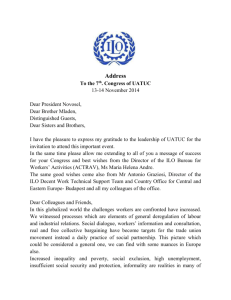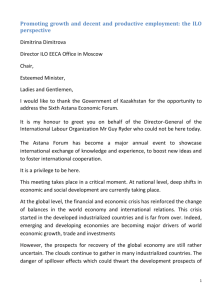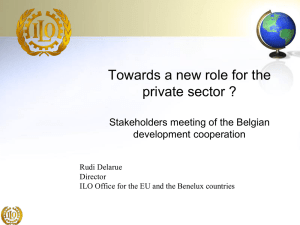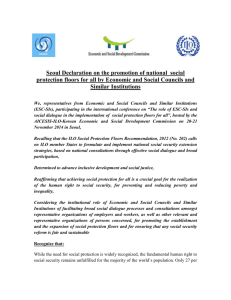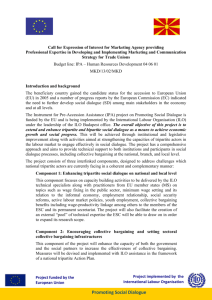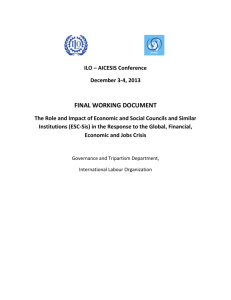131201 discours ouverture Polaski - International Association of
advertisement
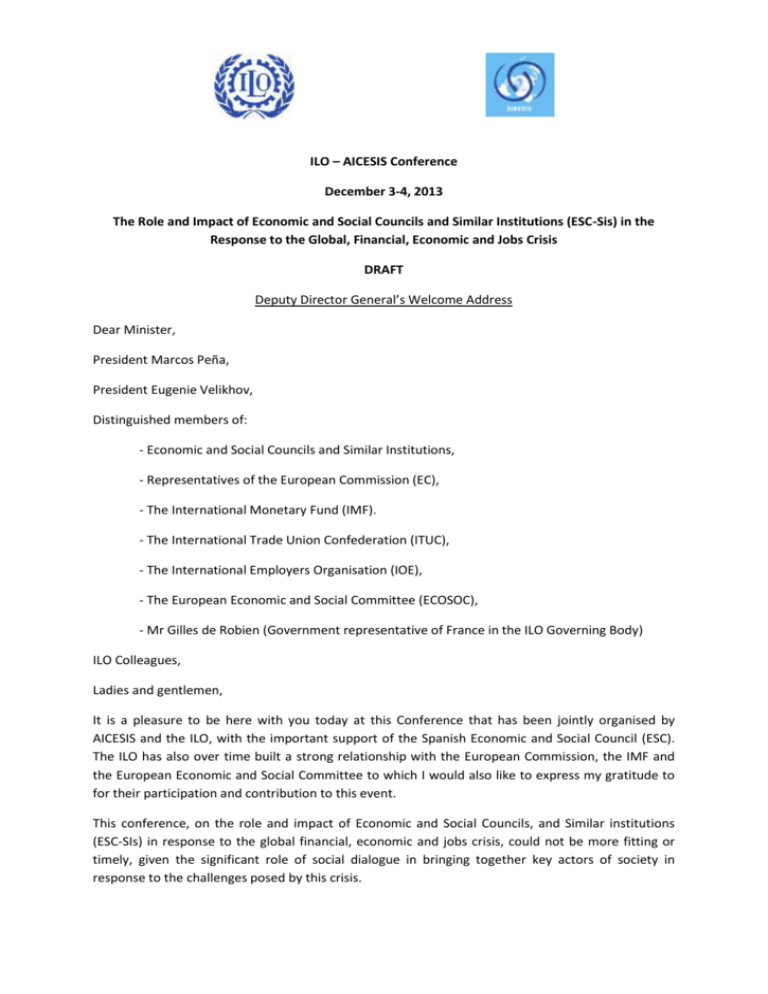
ILO – AICESIS Conference December 3-4, 2013 The Role and Impact of Economic and Social Councils and Similar Institutions (ESC-Sis) in the Response to the Global, Financial, Economic and Jobs Crisis DRAFT Deputy Director General’s Welcome Address Dear Minister, President Marcos Peña, President Eugenie Velikhov, Distinguished members of: - Economic and Social Councils and Similar Institutions, - Representatives of the European Commission (EC), - The International Monetary Fund (IMF). - The International Trade Union Confederation (ITUC), - The International Employers Organisation (IOE), - The European Economic and Social Committee (ECOSOC), - Mr Gilles de Robien (Government representative of France in the ILO Governing Body) ILO Colleagues, Ladies and gentlemen, It is a pleasure to be here with you today at this Conference that has been jointly organised by AICESIS and the ILO, with the important support of the Spanish Economic and Social Council (ESC). The ILO has also over time built a strong relationship with the European Commission, the IMF and the European Economic and Social Committee to which I would also like to express my gratitude to for their participation and contribution to this event. This conference, on the role and impact of Economic and Social Councils, and Similar institutions (ESC-SIs) in response to the global financial, economic and jobs crisis, could not be more fitting or timely, given the significant role of social dialogue in bringing together key actors of society in response to the challenges posed by this crisis. Since 2006, the fruitful relationship between the ILO and AICESIS has been based on a foundation of shared aims and objectives; namely, to promote social dialogue, tripartism and social justice. Throughout this time, the collaboration between our two institutions has led to a number of notable achievements. In addition, AICESIS has endorsed the concept of the Decent Work Agenda and supported the conclusions of the World Commission for a fair Globalisation issued in 2004. Within this framework of cooperation, the two institutions have successfully and jointly organised a number of events: in Cotonou in 2010, in Senegal, Rome and the Dominican Republic in 2011. These conferences have focused on the role of Economic and Social Councils (ESCs) in promoting the Global Jobs Pact and social dialogue. Last year, in May 2012 the ILO and AICESIS jointly organized a high-level conference on the issue of social protection floors for inclusive globalization. On that occasion the ILO Director-General and the President of AICESIS signed a Memorandum of Understanding, which reinforced our partnership and ensured mutually beneficial cooperation, based on common values. Today’s conference marks the follow-up to this event, by aiming to create a forum for discussion on the challenges faced by social dialogue institutions at national level in the context of a deepening, global, economic and jobs crisis. Tripartism and social dialogue are at the heart of the ILO structure. However, in many countries especially throughout Europe, these values have come under attack since the onset of the crisis. The severity of austerity measures and fiscal consolidation have weakened the role of social partners and industrial relations institutions, while many governments have bypassed social dialogue institutions in a desperate attempt to restore growth. And yet, these institutions are more relevant now than ever, not only as forums for discussion but also in helping to conceive creative policy proposals for a sustainable recovery. Marginalising their role will bring little benefit to our economies and societies. The impact of unilateral action in the absence of social dialogue has become all too apparent in many countries, which have seen an overwhelming surge in societal conflict through increased strikes, street protests and deteriorating social climates. We must ask ourselves what the outcome of these actions will bring in years to come, when growth returns. Surely, the removal of these structures will leave little space for future negotiations, which will be a priority for many who wish to regain losses incurred during the recession. In fact, ILO research has suggested that countries with well-functioning social dialogue and strong institutions have reacted more quickly and effectively to the crisis, than countries where these have been weak or non-existent. Tripartite cooperation between governments and social partner’s is an irreplaceable form of governance in crisis management. The ILO commends the vital role that national ESCs and other tripartite bodies can play in this era of uncertainty. These institutions can equip society with important tools, necessary for tripartite discussions on national strategies and policies, which are at present essential to address the consequences of the economic and jobs crisis, and to promote a sustainable recovery. As the background paper shows, since the onset of the crisis a number of ESC- SI’s have been at the centre of response policies. Countries such as South-Africa, the Czech Republic, the Republic of Korea and many more in all regions of the world, have experienced successful negotiations of national agreements on anti-crisis measures in 2008-2009. Some measures taken include provisions to save jobs and promote enterprise sustainability, through strengthening social security systems, investing in infrastructure and job creation programmes. In order to strengthen the capacity of these social dialogue institutions, the ILO, has for many years, been providing valuable technical support to its Member States. As early as 2008, the ILO Governing Body began to formulate a series of orientations, to assist countries in developing immediate crisis response policies. And since then a number of measures have been adopted by the ILO in response to the economic and jobs crisis. The 9th ILO European Regional Meeting led to the adoption of the Oslo Declaration, which reaffirmed the ILOs commitment to helping countries affected by the crisis to overcome its negative economic, social and political consequences and restore trust through social dialogue. At the 102nd session of the ILC in 2013, the necessity to build and strengthen new spaces for cross-border social dialogue was emphasised by tripartite constituents, leading to a new framework for action on social dialogue. As will become evident throughout our discussions; global growth has decelerated and unemployment has begun to rise again leaving an accumulated total of some 197 million people without a job in 2012. Moreover, according to ILO data this figure is set to rise by an additional 5.1 million in 2013, followed by another 3 million in 2014. The Global Jobs Pact stresses that “Especially in times of heightened social tension, strengthened respect for, and use of, mechanisms of social dialogue, including collective bargaining, where appropriate at all levels, is vital”. Economic and Social Councils or Similar Tripartite Institutions have a key role to play in this process by providing an appropriate framework for social dialogue, and among other things, ensuring the effective implementation of negotiated policy responses. The ILO welcomes closer collaboration with AICESIS, as well the European Commission and the IMF, and trusts that this greater cooperation will grant us the tools to better address the present challenges and to promote policy coherence. In order to facilitate our discussions, the ILO and AICESIS have conducted a survey on the basis of which a background paper has been prepared. This paper, in front of you, will provide a good basis for exchanging country experiences on the impact of the global economic and jobs crisis, and to draw important lessons for the future. I hope that the discussions today and tomorrow will be extremely open and rich, as we have a lot to learn from the variety of experiences in the room. In addition, the presence of academics will surely enrich these discussions. Finally, let me once again express my sincere gratitude to the Spanish Economic and Social Council and to their team for their warm and hospitable welcome, and I wish you all a very successful conference. Sandra POLASKI, Deputy Director General of the International Labour Organisation Spain, 3 December 2013.
